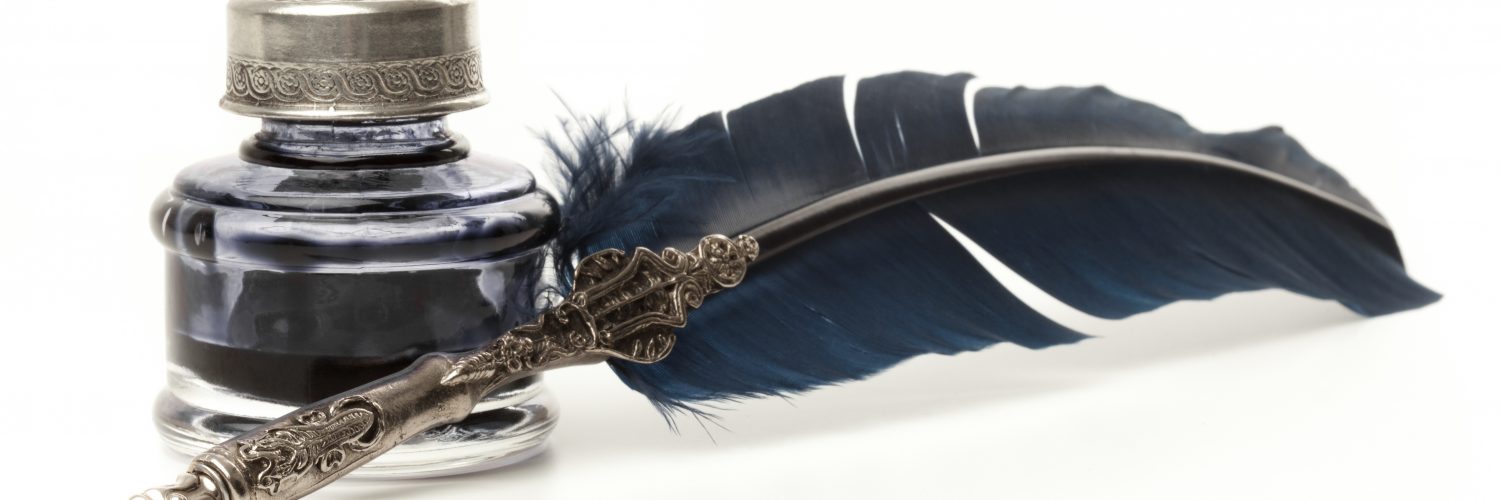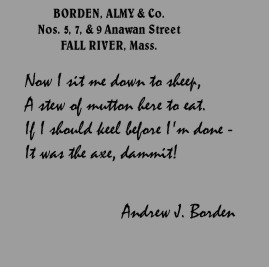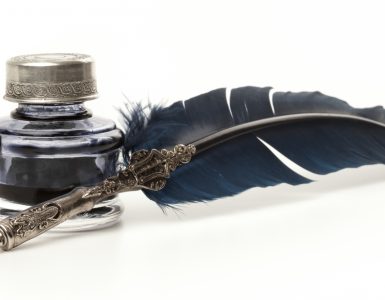By Doug Walters
First published in December/January, 2005, Volume 2, Issue 6, The Hatchet: Journal of Lizzie Borden Studies.
A Song to Clean Your Bench By
Or
“How To Write A Lyric To Which Your Heirs Are Not Averse.”
Friends, Readers, Bordenites – Lend me your ears!
I come today not at all to praise ye humble compositor’s bench, and would confess a strong desire to bury the filthy thing and be done with the entire matter.
For those who never have seen such a contraption as a compositor’s bench, they are a sight to behold indeed – something between a desk and a table, but arranged and outfitted for a highly specific purpose.
Most models (the beast in front of me being an example thereof) had a varying number of drawers on either right or left side, and nearly all had a large, reinforced drawer in the center, being wide enough – and stout enough – to hold at least one box or tray of type, the full-metal-jacket variety as it were. Places too for “copy pencils” and other necessities.
As for cleaning one of these behemoths (my project of the past two days) the best advice comes to three simple words: Hire it done!
Ye humble Compositor is considering composition of a “Song To Clean Your Bench By” in tribute to a hard lesson well-learned, a project with which the SPCA has graciously offered assistance.
The following, however, ought to be enough to convey some small idea of the Stygian horrors endured in the interests of hygiene and general sanitation:
I must clean this bench –
Oh my, what a stench!
It brings to mind foul words
Best uttered in French.
Ink caked on the fingers,
Strong fumes in the nose;
Four S’s, three X’s, and
Two Z’s ‘tween the toes.
Messy though the business surely was, it did bear some strange and interesting fruit. Stuffed tightly into one of the side drawers of ye humble bench, beneath well-petrified remains of approximately 42 large insects of unknown ancestry – some species of mantis or cricket by their appearance – were several sheets of paper.
“Notes” is the first logical thought which came to mind, but closer inspection following removal of the numerous cricketine corpses revealed something more: The papers also bore the suggestion of headlines – these being scrawled at the head of the first page in thickly-penciled uppercase letters, and scattered here and there were stress markings which would suggest italics – to this eye, at any rate.
The dispatch is unsigned, but it may be surmised (or at least reasonably suspected) that its writer was either new to the job or ignorant of the shorthand writing methods then in common use. For this ye humble Compositor is most grateful, as the chicken formerly employed to translate aforementioned shorthand worked herself into a tizzy Tuesday last and departed, in search (so said the note she left) of better wages and living conditions. She was thoughtful enough at least to leave behind three eggs, though just why she did is a matter of some question.
It may also be reasonably supposed of the dispatch that its writer was an out-of-towner, this presumption being based on the presence of the letters “FRMA” at the head of what would be the first paragraph.
Little more may be divined at this point, except to say that clues within the story indicate it was prepared some time after the preliminary hearing, but before the trial commenced at New Bedford.
Though parts are missing – this is clearly noted in the text – what follows is the apparently-unpublished story in its entirety:
New Document May Give Light
To Unseen Side of Victim Borden
FALL RIVER, Mass. – Not since the first cries of “murder” echoed up and down Second Street some months ago has the name of Borden created such a stir in this city as exists presently.
The subject of the moment, however, be neither bloody murder, nor endless debate of guilt or innocence.
Rather, at the eye of the current storm is a brief, simple document apparently penned by the late Andrew Borden. It has not the slightest legal significance, but may provide a new and welcome insight into that gentleman’s character – a clew to a side of Mr. Borden which was concealed, hidden perhaps even from those with whom he was most intimate.
Skilled as he was in the ways of business, real estate and banking administration, new evidence suggests that Andrew Borden may also have had some talent with the pen. Recently discovered tucked among the elder Borden’s business papers – indeed, scrawled upon a scrap of letterhead bearing the legend “Borden, Almy & Co.” is a single quatrain of verse. The subject thereof, according to reports, is Mr. Borden’s fondness for a certain dish.
“I want it known to you gentlemen that I divulge this with the full knowledge and consent of Miss Emma Borden, into whose care the administration of her father’s estate was given quite soon following his much-lamented demise,” said attorney Andrew Jackson Jennings of Fall River, who revealed the document’s existence this afternoon.
“I would also note my feeling (with which Miss Emma concurred) that as such, it will have no effect whatever upon the case currently pending against her sister, my client, in the Superior Courts of this Commonwealth.
Judge Blaisdell has done his work in finding probable cause to bind her over – and in good and due time, we will step forth to do our work, and break those bindings before God, the Law, and the Commonwealth of Massachusetts.”
Lawyer Jennings also commented that but for a single word therein, the scrap would make no testament apart from that of a keen mind and clever character on the part of the author.
“I will say to you one thing: I knew Andrew Borden for many years both as a client and a personal friend. Yet even to me, he never hinted that there was this ‘other’ side to himself. I am surprised, but nonetheless pleased to discover it.”
Among the townsfolk, reaction has been as swift and varied as Quequechan currents under a high gale.
Mr. Hiram Harrington of 12 Turner Street in this city was consulted as to his knowledge of the matter.
“Let me see what you have there, feller,” said he, and was handed the document, which Mr. Harrington examined carefully.
Very shortly thereafter did Hiram Harrington erupt into a gust of laughter.
“Stew of mutton,” said he, muttering almost to himself before dissolving again into a flurry of chuckles.
“Say what you will of Andrew Borden, young feller, be it truth or falsehood. He did have some fondness for mutton, and that’s the utter truth.”
“I can eat it myself – sometimes; I do not particularly care for it though because of the” – and here he lowered his voice – “it smells like soiled linens left to ferment for two weeks under a high sun!” He wrinkled his nose as if reacting to a bad smell.
“You’re certain of this, you say?” Mr. Harrington asked again.
“That I am, Sir. The page you have there I was able to borrow from Mr. Jennings himself this afternoon. What do you make of it?”
At this the gentleman sighed heavily and replied that he himself did not know what exactly to make of the paper or its content. “You understand, young feller, that my own dealings with Mr. Borden, while not outright hostile, were as few as I could make them. I can tell you this – the handwriting is definitely that of Mr. Borden.”
“Yes, Sir; it is that. Mr. Jennings and three others thus far besides yourself have confirmed the writing.”
“Let me see that again young feller,” said he, and burst into a renewed fit of laughter much louder than before, being such that within a moment or two there came a knock upon the door, whereupon Mr. Harrington stepped away to answer.
It was but a short time before he returned, still chuckling but more quietly than before.
“You may leave now, young feller, else I’ll die laughing or be arrested for breaking the peace. That was the foot-patrolman…heard the ruckus up the way there and stopped to inquire.
Let me write that down before you go, though.”
* * * * * *
[Note: Here the reporter’s copy breaks off and a large section seems to be absent, as if torn. Just above the tear, however, there is a notation stating that the document borrowed was returned to Mr. Andrew Jennings.]
The reporter’s copy now resumes:
Earnest attempt was made to contact Officer Philip Harrington of the Police Department, who years earlier had been employed by the firm upon whose letterhead the writing was scrawled. Advised, however, by Assistant Marshal John Fleet, that this gentleman is currently employed in special duties and therefore is unavailable to comment upon the matter at this time.
Miss Bridget Sullivan, lately servant girl in the Borden household, was also consulted. She said that while she could not comment upon the document directly – she had no first hand knowledge of it – it made her recall how fond she had been of her former employers.
“They were who and what they were, and I was what I was. They always treated me decent though – all of them really. Almost three years I was there. That’s a long time…” and here her voice trailed away so that it seemed she was momentarily lost in melancholy thoughts. “I wish I could be better help to you Sir,” said she. I thanked her just the same and we parted. I found myself no nearer to solving the mystery than at the start.
Neither, it would seem are we, for that’s the last of the reporter’s copy.
Andrew Borden, writer of verse – a silly notion if ever there was such. But even the whimsical sometimes raises a valid question. In this instance that is, “What manner of a man was Andrew Jackson Borden?” The Evening Standard of New Bedford describes him as “a reserved, courteous gentleman” and possessed of a “retiring disposition.”
It’s mere supposition, but I ask nonetheless: Is it not usually the “reserved and courteous” types who are often the worst for (and the best at) such things as lightning-flashes of unexpected humor like the following, found scrawled upon a scrap of letterhead bearing the legend “Borden, Almy & Co.”:
Now I sit me down to sheep,
A stew of mutton here to eat.
If I should keel before I’m done –
It was the axe, dammit!
So we have along with the question of a double murder a genuine question of character. One wonders if it too will remain unanswered.
Whoops…speaking of answers, ye humble Compositor will now desist, for a note offering assistance must be answered…
Mr. F.T. Beanswiggle
Exeter, NH
Dear Mr. Beanswiggle,
I write today to acknowledge your recent offer of assistance which was most kind. It does puzzle me though…how did you find my name. . .?
1 Reference here is to the Schlock Poetry Club of America. Mr. Farnsworth Terwilliger (“Beanie”) Beanswiggle, of Exeter and Happy Valley, New Hampshire is President of that organization.
2 Rebello, Leonard. Lizzie Borden: Past & Present. Fall River, MA: Al-Zach Press, 1999. Mr. Rebello notes at pg. 56 that Philip Harrington was employed by the firm of Borden & Almy as an apprentice cabinetmaker. Harrington referred to (but was not specific about) that employment in his testimony at New Bedford. See Burt, Trial, pg. 558.
Works Cited:
“The Borden Tragedy as Covered By the Pages of the Evening Standard, New Bedford, Massachusetts.” Electronic copy ©2004 PearTree Press, Harry Widdows, Stefani Koorey.
Burt, Frank H. The Trial of Lizzie A. Borden. Upon an indictment charging her with the murders of Abby Durfee Borden and Andrew Jackson Borden. Before the Superior Court for the County of Bristol. Presiding, C.J. Mason, J.J. Blodgett, and J.J. Dewey. Official stenographic report by Frank H. Burt (New Bedford, MA., 1893, 2 volumes). Electronic copy ©2001 Harry Widdows for LizzieAndrewBorden.com
Rebello, Leonard. Lizzie Borden: Past & Present. Fall River, MA: Al-Zach Press, 1999.
Dear Madame Editor,
I wish to correct an error in a recent article which appeared in your journal. In the column titled A Song to Clean Your Bench By, Or “How to Write a Lyric to Which Your Heirs Are Not Averse” the writer referred to some correspondence from the SPCA, identified as the “Schlock Poetry Club of America.”
This is not at all the correct name for that esteemed organization. The correct acronymic abbreviation is actually “ASPCA” – standing for “Amalgamated Schlock Poetry Consortium of America.”
To be entirely truthful about the matter tho, the Compositor feller did not get the name wrong at all. We were formerly known as the “Schlock Poetry Club of America” but decided to reconstitute as a consortium, figuring to be able to accomplish more as a union.
The original offer of assistance mentioned by the Compositor mistakenly went out on the old letterhead.
You might suppose “the other” ASPCA would be a bit aggravated, but there’s very little confusion, at least here locally. Both we and they occupy the same premises, and we keep a large sign out front that says “Animals This Way” <<- – – ->> “Poetry This Way Here.”
Additionally, the Consortium publishes a special quarterly journal called “Poetry Gone to the Dogs.” All proceeds from sales, subscriptions, and so forth go directly to “the other” ASPCA next door. (Materials, services, and time are all donated.) We either write them a check, or at Christmastime convert the checks to cash (bills & change) so that it fills a large sack. The sack is then delivered next door by one of our members, who usually takes along a puppy dressed up in a little red hat and sweater to act as the official “presenter.”
I ought to close now, as I must get ready to judge our monthly Puppy Race later this afternoon. No bets are permitted, merely donations. “Payoff” is a chicken dinner for four prepared by officers of the local Masonic lodge, along with a small bag of assorted soft treats for the winning puppy.
Actually nobody loses, thanks to an “exchange agreement” we have with local vendors here. Anyone who buys a ticket for the puppy race may save their ticket and present it at any time between races. In return they will at least receive a discount on items they might purchase from these vendors. Everyone participates – it’s merely the degree of participation that varies.
I leave you Dear Madame with best wishes and a statement of our philosophy:
You may not like our poetry
For its meter or writing style;
But see, that’s not important to us –
As long as it brings you a smile.
Most Cordially,
Farnsworth T. Beanswiggle
“Beanie”
Farnsworth T. (“Beanie”) Beanswiggle,
President
AMALGAMATED SCHLOCK POETRY CONSORTIUM OF AMERICA.
EXETER & HAPPY VALLEY, NH





